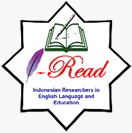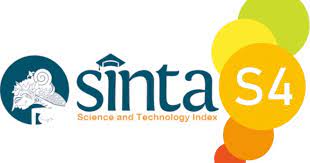EFL Students’ Perspectives on Their Self-efficacy in Speaking During Online Learning Process
DOI:
https://doi.org/10.22219/englie.v2i1.14965Abstract
This article illustrates the EFL students' perspectives toward self-efficacy of them in speaking during the online learning process. Self-efficacy defined as a person believes that he/she could manage the situation and get a positive outcome. It points out to the intuition in one’s capacity to execute and organize the action required in producing the given attainments. Self-efficacy is very crucial for students in studying a language, especially for the fourth language skills. To achieve the qualification of English communication, mastering the fourth integrated skills is very necessary. Speaking includes in this term. The aim of this article was to analyze the EFL students’ perspective about their self-efficacy in speaking during the online class activity. The research was conducted on 35 EFL learners of English Department Student at Tidar University. The researcher uses the descriptive quantitative method in analyzing the data. In obtaining them, the researcher employed a survey study by using a questionnaire with 20 close-ended questions. The result showed that the learners have enough self-efficacy in speaking during online learning. The high percentage of neutral option still dominate them. However, the final result of the data shows that learners have strong self-efficacy. Keywords: EFL Students, Online Learning, Speaking, Self-efficacy
Downloads
References
REFERENCES
Aboagye, E., Yawson, J. A., & Appiah, K. N. (2020). COVID-19 and E-Learning : the Challenges of Students in Tertiary Institutions. 2(1), 1–8.
Akdon, R. (2007). Rumus dan Data dalam Analisis Statistika. Penerbit Alfabeta.
Alawiyah, T. (2018). Speaking Self-Efficacy and EFL Student Teachers’ Speaking Achievement. Edukasi: Jurnal Pendidikan Dan Pengajaran, 5(1), 87–96.https://doi.org/10.19109/ejpp.v5i1.2052
Apuke, O. D. (2017). Quantitative Research Methods : A Synopsis Approach. Kuwait Chapter of Arabian Journal of Business and Management Review, 6(11), 40–47. https://doi.org/10.12816/0040336
Aydogan, H. and A. A. A. (2014). The Four Basic Language Skills, Whole Language & Integrated Skill Approach in Mainstream University Classrooms in Turkey. Mediterranean Journal of Social Sciences, 5(9), 672–680.
Bandura, A. (1997). Self-Efficacy: The Exercise of Control. W. H. Freeman and Company. Beglar, D., & Nemoto, T. (2014). Developing Likert-scale questionnaires. JALT2013 Conference Proceedings, 1–8.
Boone, H. N., Boone, D. A., & Virginia, W. (2012). Analyzing Likert Data Likert-Type Versus Likert Scales. 50(2).
Cohen, L. (2007). Research Methods in Education. In Research Methods in Education. https://doi.org/10.4324/9780203029053
Fatimah, S. (2018). The Correlation Between Students’ Self-efficacy Towards Their Spekaing Skills at the Eleventh Grade Students of MAN Salatiga in the Academic Year of 2018/2019. State Institute for Islamic Studies (IAIN) Salatiga.
Hodges, C. B. (2008). Self-efficacy in the context of online learning environments: A review of the literature and directions for research. Performance Improvement Quarterly, 20(3–4), 7–25. doi:10.1002/piq.20001
Joshi, A., Kale, S., Chandel, S., & Pal, D. (2015). Likert Scale: Explored and Explained. British Journal of Applied Science & Technology, 7(4), 396–403. https://doi.org/10.9734/bjast/2015/14975
Kamil, D., & Mukminin, A. (2015). Indonesian Students’ Multicultural Awareness in Homogeneously and Heterogeneously Populated Schools and Multicultural Education Policy. Asia-Pacific Collaborative Education Journal, 11(1), 29–41. https://repository.unja.ac.id/158/1/Indonesian Students’ Multicultural Awareness.pdf
Kazi, A. M. (2012). Questionnaire designing and validation. Journal of the Pakistan Medical Association, 62(5), 514–516.
Leedy, P. D., & Ormrod, E. J. (2005). Practical research: Planning and design. Pearson Education.
Michael, K. (2012). Virtual classroom: reflections of online learning. Emerald Group Publishing Limited, 29(3), 156-165(10). https://doi.org/10.1108/10650741211243175
Nuvitasari, I., Rizka Safriyani, R., & Rakhmawati, R. (2018). Students’ Self-Efficacy In Public Speaking Program At SMKN 1 Lamongan. 145, 244–250. https://doi.org/10.2991/iconelt-17.2018.52
Onal, N., & Ibili, E. (2017). (2017). E-ogrenme ortamlari [E-learning environment]. In S. Sahin & C. Uluyol (Eds.), Egitimde Bilisim Teknolojileri [Information Technology in Education]. Pegem Akademi.
Paradewari, D. S. (2017). Investigating Students’ Self-Efficacy of Public Speaking. International Journal of Education and Research, 5(10), 97–108. www.ijern.com
Riduan, & Akdon. (2007). Rumus dan Data dalam Analisis Statistika. Penerbit Alfabeta.
Salkind, N. (2012). “Technique for the Measurement of Attitudes, A.” Encyclopedia of Research Design.https://doi.org/10.4135/9781412961288.n454
Schneider, S. L., & Laurin, M. (2020). Distance learning in the era of COVID ‑ 19. Archives of Dermatological Research, 0123456789, 3–4. https://doi.org/10.1007/s00403-020-02088-9
Shumin, K. (2002). Factors to consider: Developing adult EFL student speaking abilities. In J. C. Richards & W. A. Renandya (Eds.). Cambridge University Press.
Tahmassian, K., & Moghadam, N. J. (2011). Relationship between self-efficacy and symptoms of anxiety, depression, worry and social avoidance in a normal sample of students. Iranian Journal of Psychiatry and Behavioral Sciences, 5(2), 91–98.
Taipjutorus, W., Hansen, S., & Brown, M. (2012). Investigating a Relationship between Learner Control and Self-Efficacy in an Online Learning Environment. Journal of Open, Flexible and Distance Learning, 16(1), 56–69. http://search.ebscohost.com/login.aspx?direct=true&db=eric&AN=EJ1079899&site=ehost-live
Willits, F. K., Theodori, G. L. & L. (2016). Another look at Likert scales. Journal of Rural Social Sciences, 31(3), 126–139. http://journalofruralsocialsciences.org/pages/Articles/JRSS 2016 31/3/JRSS 2016 31 3 126-139.pdf
Downloads
Published
How to Cite
Issue
Section
License
Copyright (c) 2021 Ningias, R. A., & Indriani, L.

This work is licensed under a Creative Commons Attribution-ShareAlike 4.0 International License.
Authors who publish with English Learning Innovation (englie) agree to the following terms:
- For all articles published in English Learning Innovation (englie), copyright is retained by the authors. Authors give permission to the publisher to announce the work with conditions. When the manuscript is accepted for publication, the authors agree to automatic transfer of the publishing right to the publisher.
- Authors retain copyright and grant the journal right of first publication with the work simultaneously licensed under a Creative Commons Attribution-ShareAlike 4.0 International License that allows others to share the work with an acknowledgement of the work's authorship and initial publication in this journal.
- Authors are able to enter into separate, additional contractual arrangements for the non-exclusive distribution of the journal's published version of the work (e.g., post it to an institutional repository or publish it in a book), with an acknowledgment of its initial publication in this journal.
- Authors are permitted and encouraged to post their work online (e.g., in institutional repositories or on their website) prior to and during the submission process, as it can lead to productive exchanges, as well as earlier and greater citation of published work (See The Effect of Open Access).
This work is licensed under a Creative Commons Attribution-ShareAlike 4.0 International License.

















1.png)












